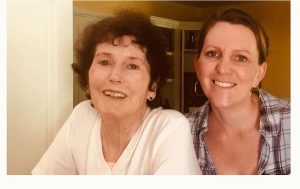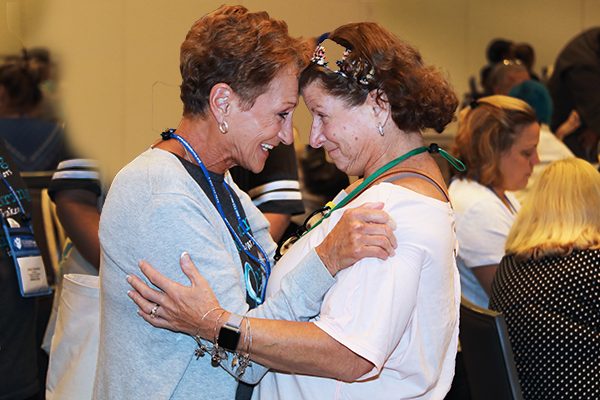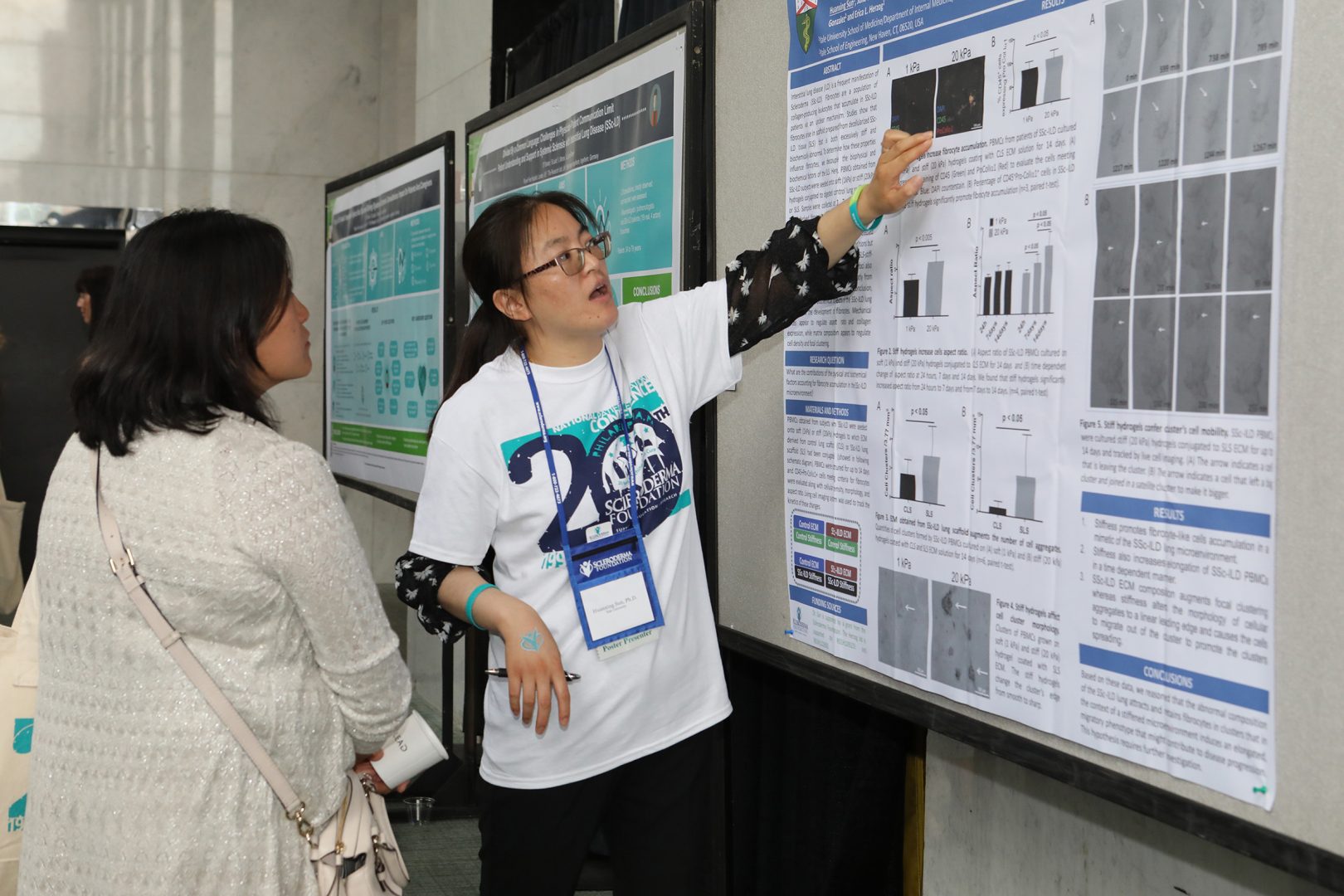Thank you for joining the National Scleroderma Foundation on Feb. 29, to call attention to rare diseases, for Rare Disease Day. Read our scleroderma Rare Disease Day stories below.
CEO Mary Wheatley has a special message as we kick off a day of highlighting Rare Disease Day stories.
On RareDisease Day, we are grateful to be part of the Haussler family’s support system in their battle against scleroderma.
“A disease like this—a chronic condition—is so degenerative and there’s no cure. When one person gets sick, the entire family gets sick. My family and I have all gone through so many cycles of grieving. And scleroderma has consumed us for so long. We felt totally overwhelmed. We did our best to manage a disease that changed course constantly. But we were always waiting for tests. Always on edge. There was always this sense of dread.” –Rachel Meyn Ugarte, Caregiver to her mother, Eliza
Caring for someone with a rare disease can be overwhelming.

Truett Seminary graduate, Rebekah Graff, shares her experience with scleroderma. “Even though it sounds cliché, there’s a reason for this. If at the end of the day there’s another 12-year-old girl out there who sees my story, that’s what makes it all worth it.”

Tom Fry was diagnosed at the age of 30 with the rarest form of scleroderma. Today, Tom enjoys the community he found through the Foundation and continues to raise awareness about scleroderma. He looks forward to continuing the effort and wants to use his voice to spread this inspiring message: “We can make change and miracles can still happen! Let’s keep the hope alive and keep spreading awareness.”

Marilyn Sibley shares:
Twenty-one years ago, my sister, Rosa Johnson was diagnosed with a rare disease called “Diffuse Scleroderma.”
My family was told this is a chronic, progressive, autoimmune disease which can impact all parts of the body. The doctor’s told us there were treatments to help; but there was no cure.
The disease changed my sister’s life; however, the diagnosis turned her into a champion for people with scleroderma. She found the illness difficult, but she did not allow it to slow her down. Rosa’s diagnosis forced her to realize there were many rare diseases that affected women, particularly women of color.
She spent the rest of her life raising awareness about scleroderma, a disease that causes the skin and connective tissues to harden. Internal organs, blood vessels and joints to be affected.
I became my sister’s caregiver and worked alongside her raising awareness about this illness.
Unfortunately, Rosa lost her battle to scleroderma in 2018. Up until her last day, she urged us to continue educating the public about rare diseases and raising funds to find a cure. Every dollar raised helps us to support those struggling with this terrible disease and move one step closer to finding a cure.
Rare Disease Day for me means another opportunity to share my sister’s journey and bring awareness to scleroderma and other rare diseases.
Knowledge is power. Each one, reach one, teach one.

As a woman with scleroderma caring for a young child, Amanda Lippincott is hopeful for a future free of scleroderma. She’s recognizing Rare Disease Day.
“As a mom to an 11- and 9-year-old at the time, my diagnosis was a tough blow. I led an active and healthy lifestyle which was also getting harder and harder to do. There were days when I thought I was done. I didn’t want to be poked and prodded anymore, I didn’t want to deal with the side effects of the medication. I didn’t want my children seeing me with the IV hanging out of my arm. But then I would remember how lucky I was to still have the ability to fight.”
Jillian DeRisi is a 40-year-old mother, wife, fitness instructor and travel agent. She has a 13-year-old son, Luca, and a 10-year-old daughter, Amelia. Jillian has been married to her husband, Bob, for 15 years, and she also has diffuse systemic scleroderma with RNA III antibody.
In April of 2021, Jillian’s wrists and hands started to hurt and became painfully swollen, dry, and itchy. Soon her joints started to bother her, too, particularly her elbows, knees and hips.
“I’m a fitness instructor, and these changes were not gradual. I didn’t attribute them to “getting older,” either. I had an EMG done on my hands at which time the doctor said I probably had some kind of inflammatory arthritis. I called every rheumatologist in my area to see who could see me first. I didn’t have the best experience or a definitive diagnosis with that doctor, but I kept going. I changed my primary care physician who put me in contact with another rheumatologist who would confirm my diagnosis in August 2021: Diffuse systemic scleroderma with RNA III antibody.”
Jillian was soon put on a low dose of methotrexate to help with pain, and in January 2022, she became a patient at Johns Hopkins Scleroderma Research center. Both rheumatologists there agreed to put her on Cellcept. But her skin score and pain level were going up and she began having tendon friction rubs. By September 2022, she was approved for IVIG infusion treatment for my accompanying Myositis. At the beginning of February 2023, she was told that my skin score has gone done and my muscle strength has gone up.
“SSc will be a part of my life forever and my fight will never end, but I will try my hardest for those warriors who lost their battle and give hope to those newly diagnosed. I make a point to participate in any study Johns Hopkins offers for early-stage patients. I hope that my scans, blood samples, skin samples, will help future patients in some way. I still teach a few classes a week at the Newtown Athletic Club, who, through their Have a Heart Foundation recently donated $2500 to the National Scleroderma Foundation. I believe exercise is medicine and as my physical therapist have said ‘motion is lotion’. As much as it hurts, I continue moving so that I can continue to keep moving! The support I have from my family and community is immeasurable. My husband said the 3 most special words to me early on: ‘We’ve got this’. He continues to say this to me on the good days and the bad, and it gives me strength. Today, on #RareDiseaseDay, I want to remind others with scleroderma or any rare disease: Be your own biggest advocate and always remember: WE’VE GOT THIS!”


Carol Feghali-Bostwick, Ph.D., is a prominent leader in the world of scleroderma research. She’s also a member of the National Scleroderma Foundation Board of Directors and Medical & Scientific Advisory Board. Learn more about her work to further treatment of this disease. Feghali-Bostwick Basic Research Lab | College of Medicine | MUSC. On Rare Disease Day, we thank those who commit their time and talent to find a cure.

Hannah Weber is a young adult with scleroderma. On this Rare Disease Day, she shares the challenges that come with the disease and the importance of a strong support system.
In 7th grade, Anna Seaman got involved with the National Scleroderma Foundation when her mother, Jill, was diagnosed with scleroderma. Now Anna wants to become a doctor and help give people with scleroderma a voice. There are plenty of ways to raise awareness! Hear more from Anna: https://youtu.be/up_TE7L0Qe0?t=1948


